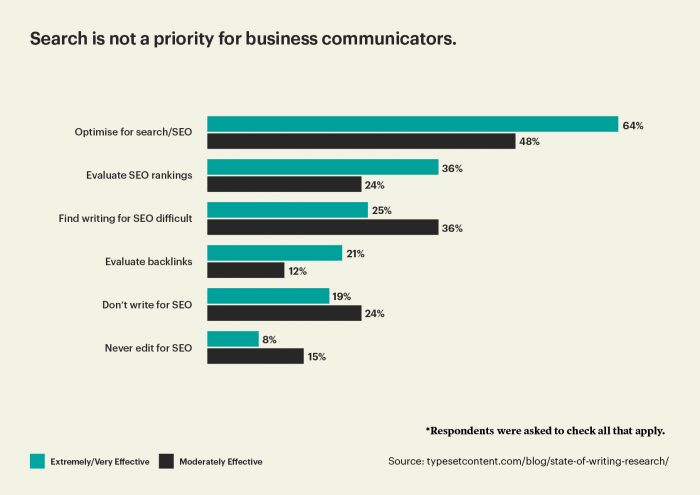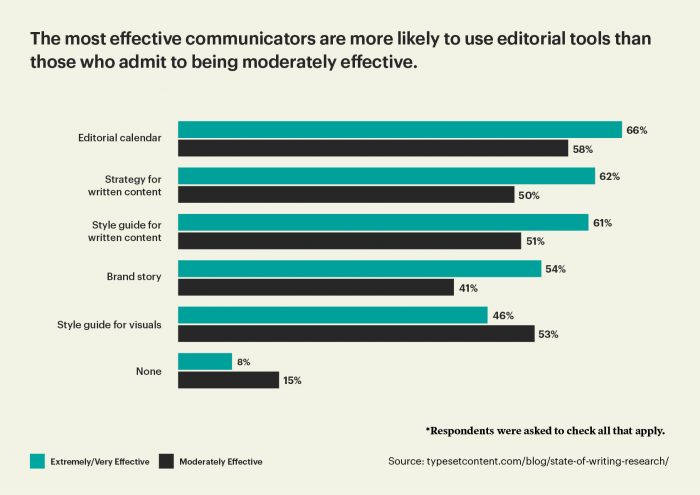
Marketers are either struggling with SEO or simply not prioritising it at all.
Of all of the things we uncovered in our State of Writing 2020 research, this was perhaps the most astonishing — especially considering most of the respondents were publishing online, where SEO has a massive impact on the reach and effectiveness of content.

Yet two recent industry experiences tell me the problem could be much worse. That is to say, it’s not that SEO isn’t a matter of priority; it’s that the whole area causes confusion and doubt, if not downright fear.
Recently, Michele Linn started a conversation on LinkedIn about the importance of SEO, which led to a lengthy discussion about why writers find the topic so difficult. It covered everything from poor content briefings to unrealistic expectations from businesses. It also showed there’s confusion about the difference between optimising your writing for SEO and SEO services.
READ MORE: 12 SEO tips to make your blog post more effective
Shortly after Michele’s LinkedIn post, I facilitated a seminar for the State of Writing research for Site Core’s Content Conversations series. The questions about SEO came fast and furious, proving the relationship between content marketing and SEO is complicated.
 To help clear up some of the confusion, I asked Andy Peterson, Vice President of Content Strategy at StitchDX in Boston, USA, for his advice on how marketers can improve their attempts at writing for SEO. He started off by defining his main goal for content effectiveness, an important first step for any content marketing program.
To help clear up some of the confusion, I asked Andy Peterson, Vice President of Content Strategy at StitchDX in Boston, USA, for his advice on how marketers can improve their attempts at writing for SEO. He started off by defining his main goal for content effectiveness, an important first step for any content marketing program.
“Personally, and for my firm and its customers, I want content to drive traffic to a site through organic search. This ultimately leads to the visitor providing his or her data, typically an email address, thus converting to a lead,” Andy said.
I asked Andy why he thinks so many people have difficulty writing for search. He was quick to make a point that is often forgotten when discussing SEO: writing is hard to begin with, even before you add in search considerations.
“Anything is difficult if you don’t know how to do it, you don’t have the tools, or if you haven’t practiced it or built the muscle needed to do it well,” he said.
“I can sit in on bass with a blues band down at the local pub but I couldn’t begin to knit a sweater.”
Andy also said that, once you factor in research, writing for SEO does get more time-consuming. Time pressure can make things difficult if your deadlines or workloads don’t permit you to do the job as thoroughly as you would like.
Our research shows a big discrepancy between the most effective business communicators and those who are only moderately effective when it comes to search. The majority of the most effective communicators optimise for search (64 per cent) compared to less than half of moderately effective communicators (48 per cent). I asked Andy how he optimises his blog posts for search and he gave a simple, 6-step process anyone can use.
Encouragingly, Andy said this becomes easy with practice. Nearly every piece of online content at StitchDX is reviewed and optimised for search prior to publication.
He believes SEO copywriting is something that any writer can learn — and should learn — if writing for digital.
Andy cautions that a writer can do all six steps but it’s no guarantee a page will rank high because there are so many factors in play when it comes to search rankings. He advises that making a habit of doing all six steps puts the writer in control of key technical and on-page attributes which impact SEO.
Even with a full SEO-writing skill set, Andy said copywriters and digital marketers need to shift to an SEO mindset when they sit down to write because the copywriting paradigm has changed.
“It’s no longer the clever headline that draws your reader in. Now it’s the search engine — it’s not a stretch to think of Google as your primary audience,” Andy says.
“In ye olden days of direct mail and print, the mission was to grab attention — to stand out in the mail pile or the magazine.
Andy reminds us the audience is now in control. People go to Google looking for specific information. Ideally your content will meet them where they are. But he also cautions marketers and business communicators about what hasn’t changed.
“It is still incumbent upon the copywriter to answer the reader’s question, ‘Why should I care?’ That is done the way it’s been done for decades upon decades, with clear, benefit-driven copy that answers the reader’s pain points — or promises better quality of life — in a brand-accurate voice.”
Andy’s point about a brand-accurate voice is well taken. The State of Writing research also shows editorial rigour is a crucial part of writing effectiveness.
More than half of the most effective communicators (54 per cent) are more likely to use a brand story than those who are moderately effective (41 per cent). The most effective communicators are also more likely to have a style guide for written content which should address SEO requirements for writers.

Andy’s advice about writing for SEO is fantastic, but even the most proficient writer is going to run into trouble without clear oversight.
Having a strategy for written content is a key indicator for writing effectiveness, with 62 per cent of the most effective business communicators using one compared to 50 per cent of those experiencing moderate success. A documented content marketing strategy is the place where SEO goals and how they’re going to be measured are detailed.
 According to Alischa Wunsch, Managing Director and Digital Marketing Strategist, Multiplier Digital, writing content to achieve SEO objectives can be challenging if you don’t have a clear SEO strategy mapped out and your SEO priorities clearly identified. And, for most writers, achieving this goes beyond what we can do on a page.
According to Alischa Wunsch, Managing Director and Digital Marketing Strategist, Multiplier Digital, writing content to achieve SEO objectives can be challenging if you don’t have a clear SEO strategy mapped out and your SEO priorities clearly identified. And, for most writers, achieving this goes beyond what we can do on a page.
“The starting point is to have a strong understanding of SEO theory and algorithmic ranking factors,” Alischa said.
She points to a number of different indicators you can use to tell if your content is performing well.
“SEO rankings help you understand where your strengths and weaknesses are and where there are opportunities and gaps in the market for your content,” Alischa said.
“Link tracking helps you understand where your content is gaining exposure and contributing to your page authority.
“Competitor ranking research and analysis is crucial to understand why a competitor may be ranking when you aren’t and what they have done well, which sets the bar for what you need to beat.
“There are a multitude of data sources that need to be reviewed and analysed to set the strategy, including a wide range of elements in Google search results, Google Search Console data, Google Analytics data and insights from third-party SEO software.
“It is a complex process, but the payoff is that high-quality content that is strategically developed for SEO will continue to deliver long-term traffic gains and SEO rankings and create a body of ‘evergreen’ SEO content that becomes a business asset,” Alischa said.
READ MORE: How to improve your blog’s Google ranking
Ensure everything published on your website has been through an SEO filter. This starts with a good brief guided by a brand style guide.
Each piece of writing should use the appropriate keywords and phrases for a particular area of your business. Try to keep this to one or two main keywords and include them in your headings and subheadings.

Andy Peterson has provided the basic steps needed to optimise your content for SEO on the written page.
You can help your writers do this from the very beginning by using a template to ensure all the parts needed for SEO optimisation have been thought through, both on the page and behind the scenes. (Download our Typeset template for a good example.)
At a minimum, you’ll want to include:
Lastly, your content marketing strategy should have a detailed section on what search optimisation means for your organisation. This, combined with the brand style guide, helps your managing editor, editors and proofreaders catch any errors or omissions. It also ensures your content has been written AND edited for SEO.
If you’d like to contribute to our State of Writing research for next year, please take the State of Writing 2021 survey. All participants will receive an early copy of the report (before publication).
If you want help creating content that is optimised for SEO, get in touch with us. Every piece of content prepared by Typeset is written with search in mind. We provide your copy in a complete package to give you with everything you need for SEO writing effectiveness.
